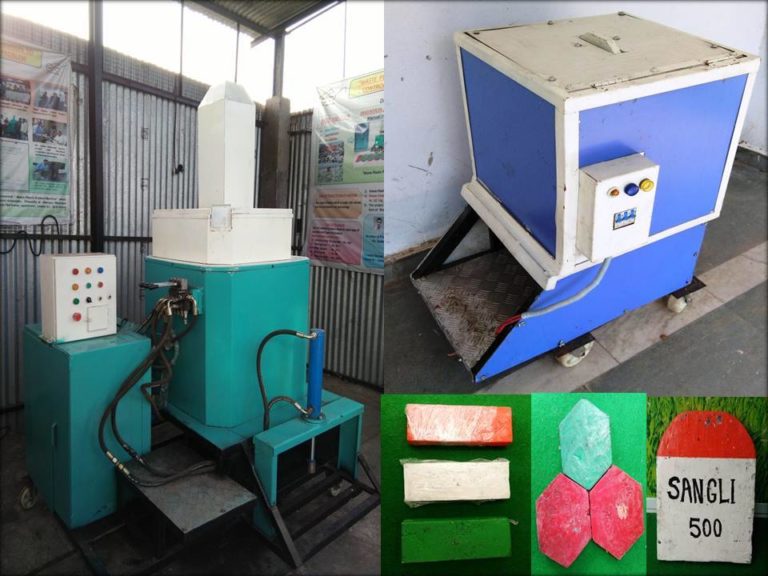
Waste Plastic Product Machine
The Waste Plastic Product Machine stands as a groundbreaking innovation in the fight against plastic pollution, offering municipalities and industries a scalable solution for effective waste management. Capable of processing diverse types of plastic waste under 150 microns, this advanced Thermomesh technology converts discarded materials into high-quality, sustainable products like plastic bricks and paver blocks. This machine exemplifies efficiency and eco-conscious manufacturing, making it an exemplary model for sustainable urban infrastructure.
A Pioneering Approach: Municipal Corpo. Plastic Waste Control Project Sets the Standard
1. Municipal Corpo. Clean City Model serves as a role model for other cities.
2.Plastic Waste Control Project reduces plastic pollution.
3.Residents receive ten rupees per kg for disposing of plastic waste.
4.Ghantagadi facilitates efficient plastic collection and rewards with tokens.
5.Plastic bricks used for road dividers, paver blocks, and footpaths.
6.Non-plastic waste used as biodegradable fertilizer.
This exemplary model encourages nationwide adoption for a cleaner environment.

NEED OF WPPM TECHNOLOGY
1. Plastic waste disposal poses a critical global challenge, with India generating over 26,000 tons of plastic waste daily. Reports from the news papers reports indicate that 40% of this waste remains untreated, contributing significantly to air, water, and land pollution. This urgent problem underscores the necessity for innovative recycling solutions that transform plastic into reusable, sustainable forms.
2. Addressing this environmental crisis, the revolutionary Waste Plastic Product Machine (WPPM), invented by Mr. Chanakya Bhaskar, offers a groundbreaking solution. This patented Thermomesh technology efficiently recycles plastic waste into versatile products such as bricks, paver blocks, and road dividers. These eco-friendly products find applications in public infrastructure projects like footpaths and security walls, delivering a sustainable and scalable approach to plastic waste management.
Salient Features of WPPM Machines
1. The abundant availability of waste plastic as a raw material offers an unmatched opportunity to revolutionize environmental management through innovative recycling technologies.
2. Products like plastic blocks demonstrate a remarkably extended lifespan, surpassing conventional materials and significantly reducing waste build-up.
3. Plastic bricks exhibit exceptional insulation properties, making them ideal for constructing walls in diverse climates, from the frigid conditions of Jammu and Kashmir to the scorching heat of Rajasthan.
4. With a compressive strength of 24 N/mm², plastic-based products offer superior resilience compared to conventional materials rated at just 3 N/mm². Additionally, their softening point of 150°C ensures durability in challenging environments.
5. Waste plastic, once molded into specific shapes, becomes permanently fixed, thereby eliminating the need for frequent recycling and supporting a sustainable production model.
This advanced waste plastic technology presents an unprecedented solution to the global plastic waste crisis, driving sustainable practices in the construction and waste management sectors worldwide.
Details of Waste Plastic Product Machine Technology , Which Invented by Chanakya Bhaskar, Inventor PWCP.
The Waste Plastic Product Machine (WPPM) by Deshmukh Research Industry is a groundbreaking invention in sustainable waste management. Engineered with patented thermomesh technology, this machine transforms diverse plastic waste—including municipal, road, and industrial types—into durable, eco-friendly products like plastic bricks, paver blocks, and road dividers. The Waste Plastic Product Machine caters to various capacities, from small-scale apartment recycling to large-scale municipal operations. The machine operates on the “Thermomesh Technology,” which converts plastic waste into a semi-liquid state through controlled heat without combustion, preserving its core properties. This process minimizes pollution and ensures high-strength outputs with compressive strength exceeding 24 N/mm². Designed for energy efficiency, the WPPM processes below 150 micron plastic waste. Its compact design, ease of operation, and advanced safety features make it ideal for urban, rural, and industrial applications. Beyond reducing landfill overflow, the WPPM contributes to a circular economy by creating valuable infrastructure products while permanently sequestering waste plastic. As a leader in innovative recycling technologies, Deshmukh Research Industry is driving global efforts toward sustainable development and environmental preservation.


Mr. Chanakya Bhaskar’s visionary “Plastic Waste Control Project (PWCP)” utilizing the cutting-edge “Waste Plastic Product Machine” technology aims to tackle India’s and the world’s plastic pollution problem. With a patented technology, the municipal corporation is currently processing approximately 1.2 tons of waste plastic to produce 800 bricks, leading to the creation of the world’s first plastic wall constructed entirely from waste plastic bricks in Jammu and Kashmir.
This remarkable plastic wall serves as an innovative solution, providing insulation in zero-degree areas and offering comfortable living accommodations. VIPs like Karan Dhawan, Madhavji Kulkarni, Sameer Joshi, Satish, and Ganesh Mali are passionately involved in this project, contributing their support to safeguard the environment from plastic pollution. The project’s dual benefits lie in converting waste plastic into usable forms while effectively mitigating cold temperatures, making it a significant step towards sustainability and environmental preservation.
Chanakya Bhaskar’s Revolutionary Solution for Plastic Waste: The Waste Plastic Product Machine
Chanakya Bhaskar’s Groundbreaking Contribution
Chanakya Bhaskar, a visionary in environmental technology, has introduced the inventive Waste Plastic Product Machine (WPPM), a pivotal development in the fight against plastic pollution. This cutting-edge invention converts waste plastic directly into functional products like bricks, paver blocks, and road dividers without the need for segregation.
The WPPM leverages advanced patented technology, ensuring an efficient, eco-friendly, and scalable solution for managing plastic waste. By utilizing the “Thermomesh Technology,” it processes plastics into a unique semi-liquid state, enabling the creation of durable and versatile products.
Benefits:
Eco-Friendly Processing: The machine minimizes pollution, utilizing heat to alter plastic states rather than burning, thus maintaining the material’s integrity.
Versatile Application: The output products cater to a variety of infrastructure needs, including roads and urban development projects.
Sustainability: WPPM products are strong, water-resistant, and offer an extended lifecycle, reducing the reliance on traditional materials.
This invention not only mitigates plastic waste but also fosters a sustainable approach to infrastructure, embodying the essence of a cleaner and greener future.
Thermomesh Technology: A Revolution in Plastic Recycling
Thermomesh Technology, a patented innovation developed by Chanakya Bhaskar, is a cornerstone of the Waste Plastic Product Machine (WPPM). This advanced process employs precise thermal regulation to transform plastic waste into a semi-liquid state without combustion, preserving the structural integrity of plastic polymers. It enables the efficient molding of plastic into robust and versatile products, including bricks, paver blocks, and road dividers. Designed for eco-friendly operations, this technology optimizes the recycling process by adapting to the availability of plastic, ensuring seamless compatibility with the machine. Thermomesh Technology stands as a transformative solution, addressing plastic pollution while advancing sustainable infrastructure development.
